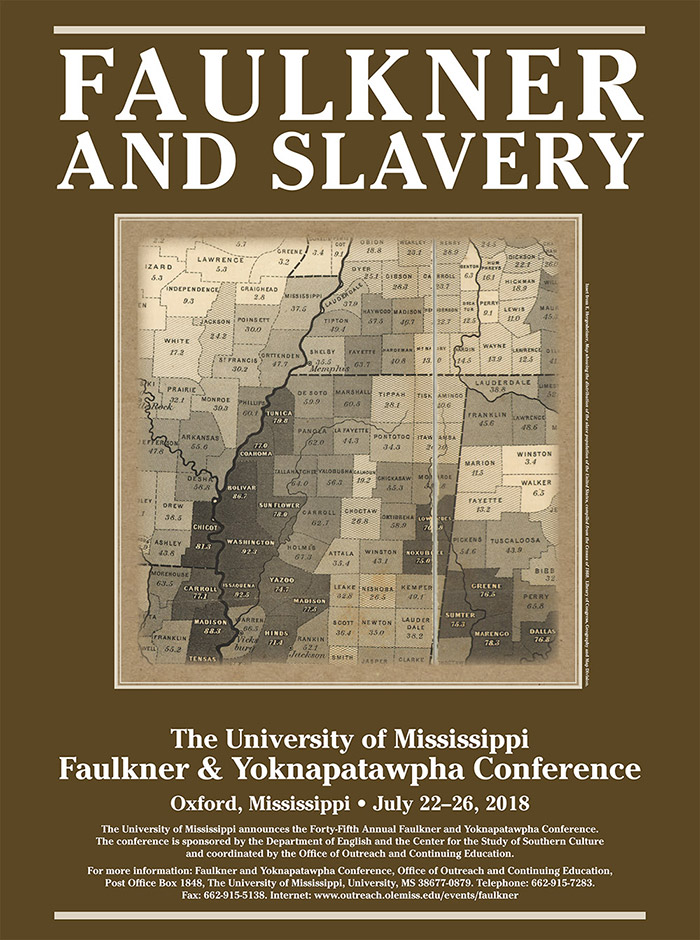
Panel. Grand Designs: Present, Future, and the Prism of Absalom, Absalom!
Location
Nutt Auditorium
Start Date
25-7-2018 8:00 AM
Description
- A Word that Didn’t Exist: How Absalom, Absalom’s Treatment of Miscegenation Implicated Jim Crow / Anders Walker, Saint Louis University
This paper looks further at Faulkner’s views of segregation, as read through his discussions of slavery. It suggests that he used slavery as a prism through which to view – and ultimately explain – segregation, a project that other southerners were taking on in the 1930s as well, not least John Crowe Ransom, Allen Tate, and the Nashville Agrarians. However, Faulkner’s opinions about Jim Crow were more nuanced than his Fugitive counter-parts, at once disapproving of Jim Crow's discriminatory aspect, but also admiring of African American responses to it. By looking at his discussions of slavery in the 1930s, this paper will suggest that Faulkner saw Jim Crow as politically flawed but culturally significant, a legal system that fostered racial pluralism and bolstered black identity. - “Unless You Stop Me” / Linda Chavers, Harvard University
This presentation discusses the fierce urgency to erase the mark of slavery from white identity in America. Through the concentric narratives in Absalom, Absalom!, and with particular focus on the real figure of Charles Bon and his imagined murder we see the embodiment of racial anxiety, urgency, and revenge. “Unless You Stop Me” argues that Faulkner’s most sophisticated and confusing novel is such because it portrays the never-ending ripple effects of slavery on the white American mind and its potential for self-destruction.
Relational Format
Conference proceeding
Recommended Citation
Walker, Anders and Chavers, Linda, "Panel. Grand Designs: Present, Future, and the Prism of Absalom, Absalom!" (2018). Faulkner and Yoknapatawpha Conference. 20.
https://egrove.olemiss.edu/fy/2018/schedule/20
COinS
Jul 25th, 8:00 AM
Panel. Grand Designs: Present, Future, and the Prism of Absalom, Absalom!
Nutt Auditorium
- A Word that Didn’t Exist: How Absalom, Absalom’s Treatment of Miscegenation Implicated Jim Crow / Anders Walker, Saint Louis University
This paper looks further at Faulkner’s views of segregation, as read through his discussions of slavery. It suggests that he used slavery as a prism through which to view – and ultimately explain – segregation, a project that other southerners were taking on in the 1930s as well, not least John Crowe Ransom, Allen Tate, and the Nashville Agrarians. However, Faulkner’s opinions about Jim Crow were more nuanced than his Fugitive counter-parts, at once disapproving of Jim Crow's discriminatory aspect, but also admiring of African American responses to it. By looking at his discussions of slavery in the 1930s, this paper will suggest that Faulkner saw Jim Crow as politically flawed but culturally significant, a legal system that fostered racial pluralism and bolstered black identity. - “Unless You Stop Me” / Linda Chavers, Harvard University
This presentation discusses the fierce urgency to erase the mark of slavery from white identity in America. Through the concentric narratives in Absalom, Absalom!, and with particular focus on the real figure of Charles Bon and his imagined murder we see the embodiment of racial anxiety, urgency, and revenge. “Unless You Stop Me” argues that Faulkner’s most sophisticated and confusing novel is such because it portrays the never-ending ripple effects of slavery on the white American mind and its potential for self-destruction.

